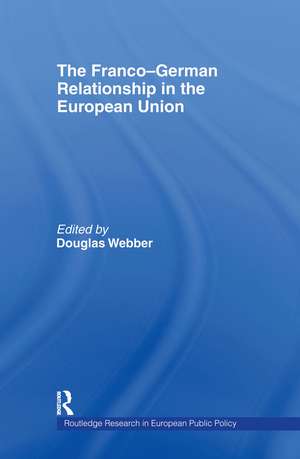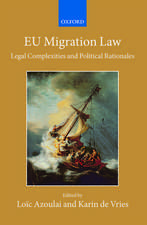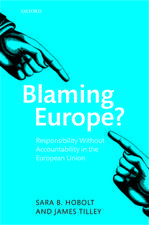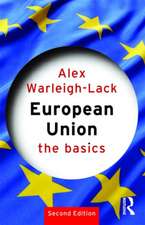The Franco-German Relationship in the EU: Routledge Research in European Public Policy
Editat de Douglas Webberen Limba Engleză Hardback – 8 iul 1999
Preț: 1274.11 lei
Preț vechi: 1553.79 lei
-18% Nou
Puncte Express: 1911
Preț estimativ în valută:
243.79€ • 255.23$ • 201.73£
243.79€ • 255.23$ • 201.73£
Carte tipărită la comandă
Livrare economică 05-19 aprilie
Preluare comenzi: 021 569.72.76
Specificații
ISBN-13: 9780415170659
ISBN-10: 0415170656
Pagini: 208
Ilustrații: 1
Dimensiuni: 156 x 234 x 13 mm
Greutate: 0.5 kg
Ediția:New.
Editura: Taylor & Francis
Colecția Routledge
Seria Routledge Research in European Public Policy
Locul publicării:Oxford, United Kingdom
ISBN-10: 0415170656
Pagini: 208
Ilustrații: 1
Dimensiuni: 156 x 234 x 13 mm
Greutate: 0.5 kg
Ediția:New.
Editura: Taylor & Francis
Colecția Routledge
Seria Routledge Research in European Public Policy
Locul publicării:Oxford, United Kingdom
Public țintă
PostgraduateCuprins
List of abreviations 1. Introduction Douglas Webber 2. Monetary Union: Economic competition and political negotiation Jonathan Story 3. France, Germany, the Intergovernmental Conference and Eastern enlargement Patrick McCarthy 4. Mastering Differences: The Franco-German alliance and the liberalisation of European electricity markets Susanne Schmidt 5. From high to low politics in Franco-German relations: The case of telecommunications Volker Schneider and Thierry Vedel 6. Integration with a spluttering engine: The Franco-German relationship in European research and technology policy Burkard Eberlein and Edgar Grande 7. Agricultural policy: the hard core Douglas Webber 8. An awkward alliance: France, Germany and social policy Martin Rhodes 9. Franco-German co-operation in foreign affairs, security and defence: A case study Amaya Bloch-Lainé 10. France, Germany and immigration policy: A paradoxical convergence Patrick Weil 11. Conclusion Douglas Webber
Descriere
This book examines the Franco-German relationship in the EU in relation to different policy sectors. It assesses the nature and importance of the relationship for the policy process.


























